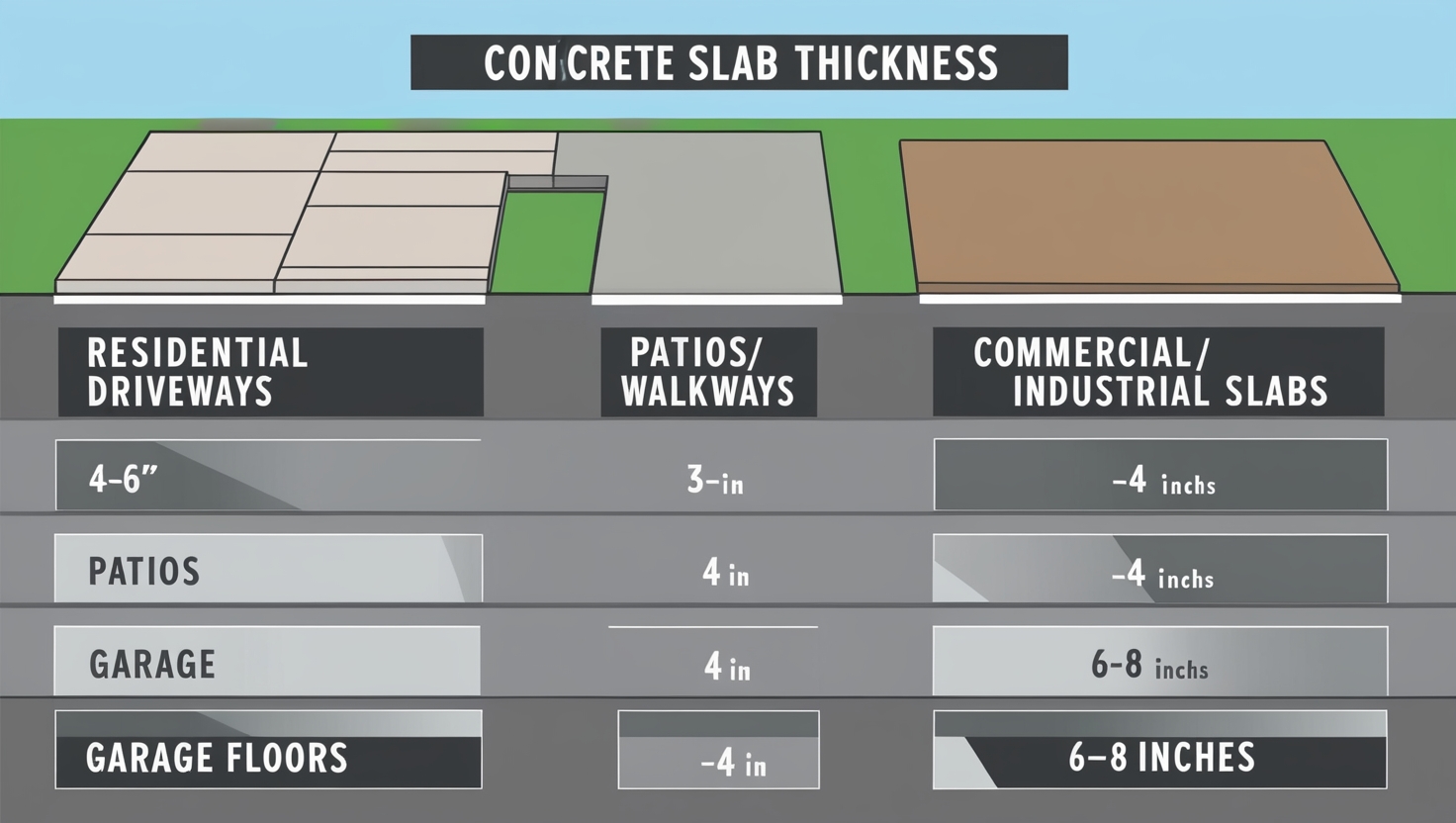Concrete slabs are big, flat pieces of concrete used in many building projects, like driveways, patios, and floors. The thickness for concrete slab is how deep the concrete layer is. Imagine it like the height of a book—the thicker the slab, the more weight it can hold and the longer it will last.
Choosing the right concrete slab for thickness is very important. If the slab is too thin, it might crack or break because it won’t be strong enough to support the weight. For example, a driveway needs to be thicker, around 4 to 6 inches, to support cars and trucks. On the other hand, a patio or walkway usually only needs a thickness of 3 to 4 inches because it only supports people and light furniture.
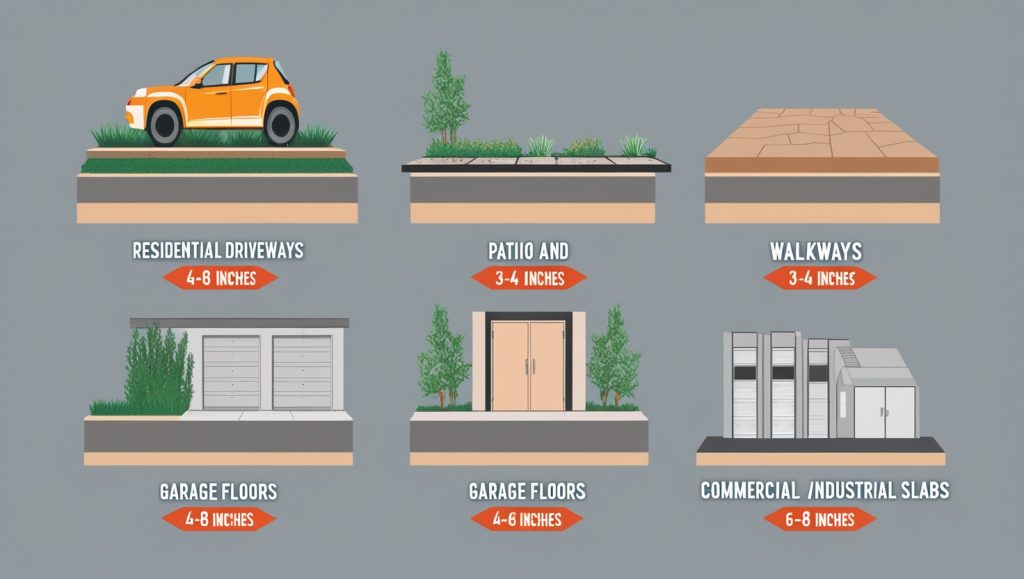
It can also depend on things like the type of soil underneath and the weather in your area. If the soil is weak or it gets very cold, you might need a thicker slab to prevent problems.
By understanding and choosing the right concrete slab for thickness, you can make sure your concrete slab will be strong and last a long time.
What is Thickness for Concrete Slab?
Thickness for the concrete slab means how deep the layer of concrete is. Think of it like the height of a book—the thicker the slab, the more support it provides. It is important because it helps the slab hold weight and stay strong.
For example, a driveway needs a concrete slab for thickness that is thick enough to hold the weight of cars and trucks, usually about 4 to 6 inches. On the other hand, a patio or walkway doesn’t need to be as thick. It’s thickness of 3 to 4 inches is usually enough because it only needs to support people and light furniture.
Choosing the correct concrete slab for thickness ensures that the slab won’t crack or break under pressure and will last a long time. Whether you’re building a driveway, patio, or any other concrete project, getting the thickness for slab right is key to making sure it stays strong and durable.
Factors That Affect Thickness for the Concrete Slab
Several things decide how thick your concrete slab needs to be. Here are the main factors:
Load Requirements
- Driveways: Driveways need to be thick enough to hold cars and trucks. A thickness of 4 to 6 inches is usually best.
- Patios and Walkways: These only need to hold people and light furniture. A thickness of 3 to 4 inches is enough.
- Garage Floors: Garages need a thickness of 4 to 6 inches to support vehicles.
- Commercial and Industrial Slabs: These need to be much thicker, often 6 to 8 inches or more, to support heavy machines.
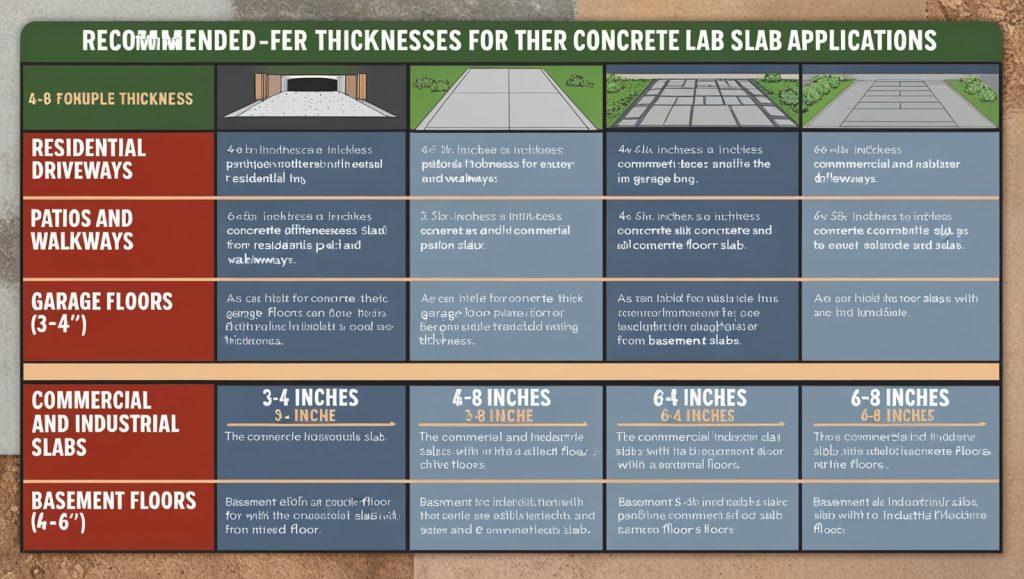
Soil Conditions
- The soil under the slab can change how thick it needs to be. If the soil is weak, you might need a thicker slab or extra support, like gravel, to prevent cracks and settling. Good soil preparation helps the slab stay level and strong.
Climate and Weather Conditions
- Weather can affect concrete slabs. In cold or rainy places, you might need a thicker slab to avoid cracks. Proper curing of the concrete is important to handle different weather conditions.
Intended Use
- Residential Uses: Areas like driveways or patios need different thicknesses compared to busy commercial areas.
- Commercial and Industrial Uses: These need thicker slabs because of the heavy machines and equipment.
Recommended Thickness
Here are some general guidelines for thickness for slab:
Residential Driveways
- What It Is: Driveways are where cars and trucks park or drive.
- Why Thickness Matters: Driveways need to be strong enough to hold the weight of these vehicles without cracking. It’s thickness for the slab of 4 to 6 inches is best. If you live in a place with heavy snow or very cold weather, a thicker slab might be a good idea to handle the extra stress from snow and ice.
Patios and Walkways
- What It Is: Patios are outdoor areas where people sit or have meals, and walkways are paths people walk on.
- Why Thickness Matters: For patios and walkways, a thickness for concrete slab of 3 to 4 inches usually works well. This thickness is enough to support people walking around and light outdoor furniture. To make sure the slab doesn’t crack, it’s good to use reinforcements like rebar (steel bars inside the concrete).
Garage Floors
- What It Is: Garage floors are where you park cars or store other vehicles.
- Why Thickness Matters: Garage floors need to be strong because they hold the weight of vehicles. A thickness for slab of 4 to 6 inches is recommended. If you have heavy equipment or multiple vehicles, you might need a thicker slab to make sure it doesn’t crack or break.
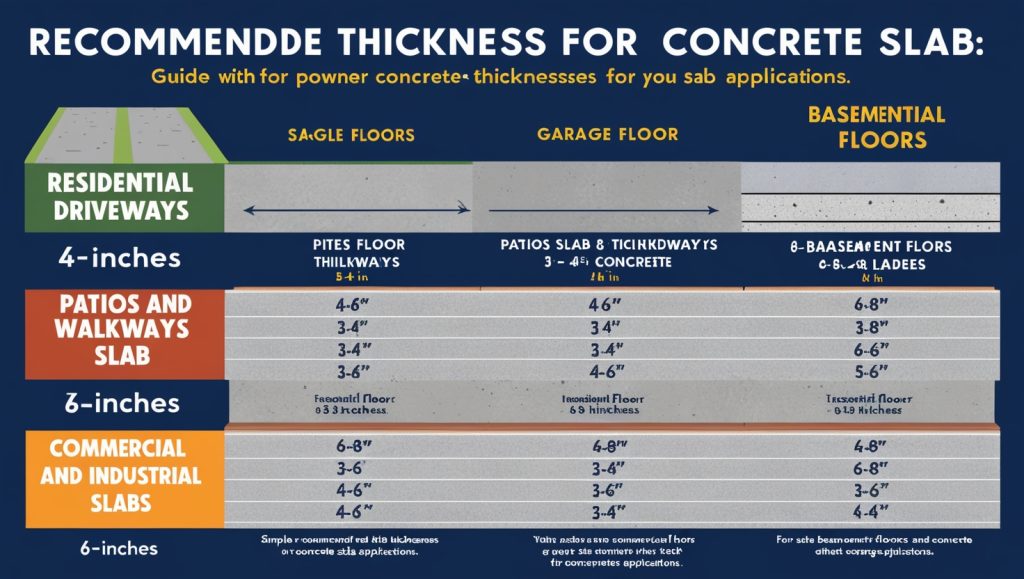
Commercial and Industrial Slabs
- What It Is: These slabs are used in places like factories or big stores where heavy machines are used.
- Why Thickness Matters: Commercial and industrial slabs need to be very thick, usually 6 to 8 inches or more. This is because they need to support the weight of heavy machines and equipment, so they need to be extra strong.
Basement Floors
- What It Is: Basement floors are the floors in the lower part of a house, below ground level.
- Why Thickness Matters: Basement floors should have a thickness for slab of 4 to 6 inches. This thickness helps the slab stay strong and avoid problems like cracking or settling over time.
How to Determine the Right Thickness for Concrete Slab
To find the right thickness for slab, follow these steps:
Assess the Load
- What It Means: Find out what the concrete slab will need to support, like cars, trucks, or heavy machines. For example, a driveway needs to support cars, while a patio only needs to support people and furniture.
- Why It Matters: Knowing what the slab will hold helps you choose the right thickness for slab. Use load calculations or ask an expert to make sure the slab is thick enough to handle the weight without breaking.
Evaluate Soil Conditions
- What It Means: Check the soil where you’ll place the concrete slab. Some soils are weak or unstable.
- Why It Matters: If the soil is weak, it might need extra support or a thicker slab to keep the concrete from settling or cracking. Preparing the soil properly helps the slab stay strong and even.
Consider Climate Factors
- What It Means: Think about the local weather where the slab will be. Extreme heat, cold, or heavy rain can affect how the concrete performs.
- Why It Matters: In places with extreme weather, you might need a thicker slab or special curing methods to make sure the concrete stays strong and doesn’t crack.
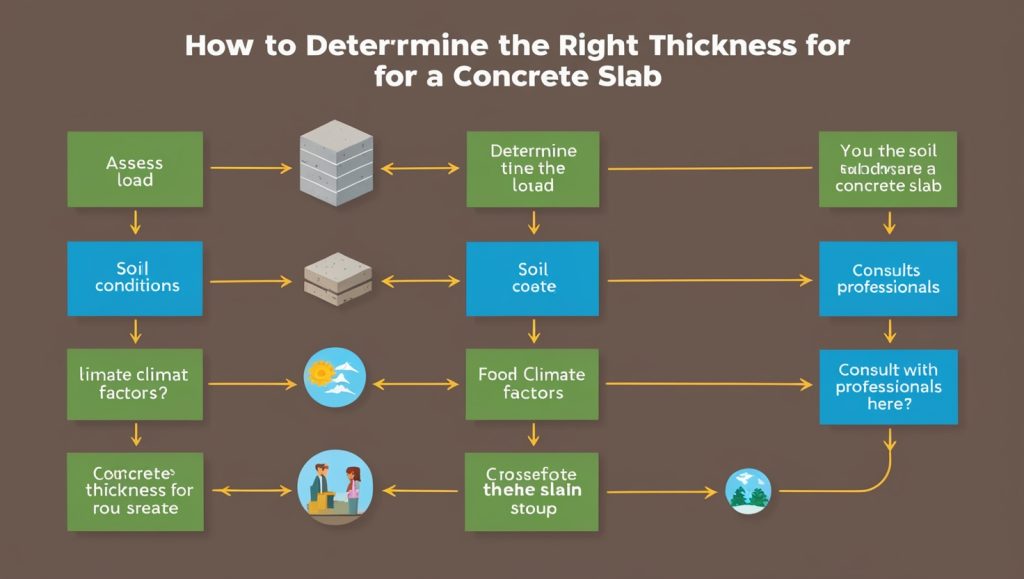
Consult with Professionals
- What It Means: If you’re not sure about how thick the slab should be, ask a concrete expert or builder for help.
- Why It Matters: Professionals can give you the best advice based on your specific project and conditions, ensuring you choose the right thickness for slab.
Best Practices for Installing Concrete Slabs
To get a great concrete slab, follow these tips:
Prepare the Base
- What It Means: Before you pour the concrete, get the area ready. This means compacting the soil to make it firm and adding a layer of gravel if needed. You also need to set up formwork, which are wooden or metal frames that keep the concrete in the right shape.
- Why It Matters: Preparing the base properly helps ensure that the concrete slab is stable and evenly supported. This is crucial to work correctly and to prevent problems like cracks.
Use Reinforcement
- What It Means: Add materials like rebar (steel bars) inside the concrete. This helps make the slab stronger and reduces the chance of cracks.
- Why It Matters: Reinforcement is important because it supports the thickness for concrete slab and makes sure it can handle the weight without breaking. Place the rebar correctly within the slab to get the best results.
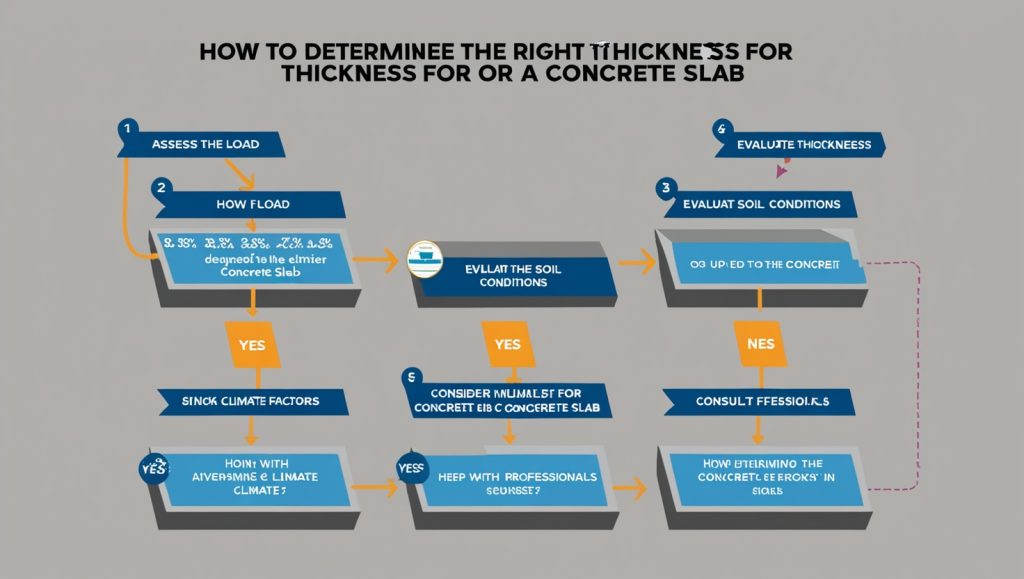
Follow Proper Pouring Techniques
- What It Means: When pouring the concrete, do it evenly and in smaller sections at a time. After pouring, smooth and level the surface to make it look nice and even.
- Why It Matters: Proper pouring helps achieve the right thickness for concrete slab and ensures that the slab will be strong and not have bumps or uneven spots.
Implement Effective Curing
- What It Means: Curing means keeping the concrete moist and protected while it sets. You can use curing compounds or cover the slab with wet burlap or plastic to keep it from drying out too quickly or being affected by extreme temperatures.
- Why It Matters: Good curing is essential for making sure it’s thickness for slab remains strong and durable. It helps the concrete set properly and prevents cracks from forming.
Conclusion
Choosing the right thickness for concrete slab is essential for ensuring strength and durability. Understanding the factors that affect it’s thickness and following proper guidelines helps your slab perform well and last longer. Whether you’re working on a driveway, patio, garage floor, or industrial slab, getting the thickness for the concrete slab correct is crucial for a strong, reliable structure. Proper thickness prevents issues like cracking and ensures that the slab can handle the intended load. By paying attention to these details, you can achieve a successful and lasting concrete project.
If you want to know about Pouring Concrete on Concrete Slab, Click here
FAQs
It is how deep the layer of concrete is. It’s like how tall a book is. The thicker the slab, the more support it gives.
The thickness of a concrete slab is important because it helps the slab hold weight and stay strong. If it’s too thin, it might crack or break.
A concrete slab for a driveway should be about 4 to 6 inches thick. This thickness can support the weight of cars and trucks.
For patios and walkways, a thickness of 3 to 4 inches is usually enough. This thickness supports people and light furniture.
A garage floor slab should be 4 to 6 inches thick. This thickness is strong enough to support vehicles.
Yes, commercial and industrial slabs need to be thicker, usually 6 to 8 inches or more, to support heavy machines and equipment.
If the soil under the slab is weak or unstable, you might need a thicker slab or extra support, like gravel, to prevent settling and cracks.
Yes, weather can affect concrete slabs. In places with cold or wet weather, a thicker slab might be needed to avoid cracks. Proper curing is also important.
To find the right thickness, think about what the slab needs to support, check the soil conditions, consider the weather, and ask an expert if you’re unsure.
To install a concrete slab well, prepare the base properly, use reinforcement like rebar, pour the concrete evenly, and keep it moist during curing.
